Charlie Jane Anders's Blog, page 39
February 16, 2016
When I was writing All the Birds in the Sky longhand I felt like...
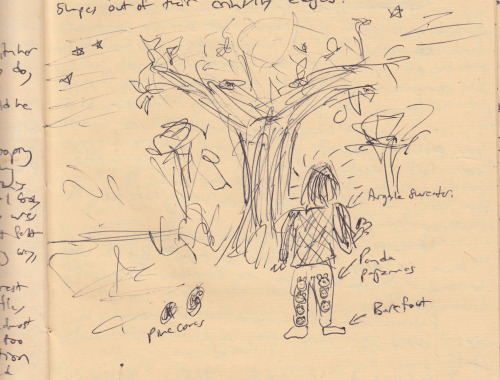
When I was writing All the Birds in the Sky longhand I felt like making a sketch of the moment where Patricia leaves her body and goes to visit the magic Tree. Just so I could picture it in my head, I guess.
February 15, 2016
The Secret Origin of Dorothea
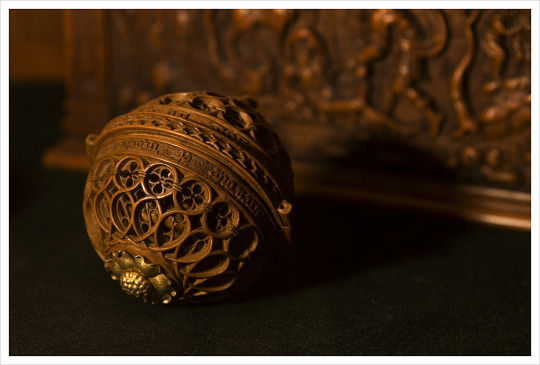
So one of the things I did while I was working on All the Birds in the Sky was that I wrote origin stories for 20 of the supporting characters in the book. Just so I could have a clearer idea of who these people were. None of this material made it into the actual book, with one or two exceptions, and I guess it’s not “canonical” or whatever.
But I’m going to be posting this stuff, along with deleted scenes and stuff, over the next couple months on this blog. First up – here’s everything there is to know about Dorothea, who is one of the witches that Patricia encounters in San Francisco.
Dorothea is a devout Catholic who never tells the truth, except in confessional. The rest of the time, she only speaks in weird riddles and strange fables. She works magic primarily by telling these bizarre magic-realist stories, which reshape reality as she tells them. One of the things I wrote about Dorothea, which did not make it into the book, was that if she likes you, her face appears old and wrinkled. If she doesn’t like you, her face is completely smooth and looks very young. (So when she meets Laurence and her face is suddenly full of laughter lines, that means she likes him.)
So here’s her origin! (Warning: Minor book spoilers ahead…)
Dorothea
went to the magical school, Eltisley Maze, in the late 1960s. In the late 60s, the Trickster school, the Maze, went full-on hippie, and was threatening to overwhelm the Healer part of the school, Eltisley Hall, with psychedelic Trickster rebellion.
(As readers of the book know, Eltisley Maze was originally two schools,
one for Healers and one for Tricksters – and they still have very
different cultures, even though they’re now officially merged.)
Dorothea got really carried away with this movement, believing that things were changing for good and the old ways were obsolete. She
dropped a bit too much acid in the middle of a particularly gnarly challenge, and when she came down from it, she found that she had become the slave of a particularly ruthless Trickster. Because
the real Tricksters saw all this
hippie shit as just another delusion that they could twist around. She asked her teachers
for help, and they were not overly sympathetic.
She was at the mercy of this evil Trickster, until she managed to trap him in a trick of her own, using sex and drugs and confusion and this
asshole’s perception that she was an idiot. She took this man’s power away from
him.
But the upshot is that Dorothea gained huge power at a price — she can
never speak the truth, about anything. She can only speak in riddles and
fables, and she gains power from lying. She’s basically an uber storyteller. She
is also super lonely because normal relationships are obviously kind of out of
the question. Like Ernesto, she is dependent on the other magicians. This
happens to everybody eventually – or else they die or burn out. One or the
other.
So Dorethea believes in loyalty to the group but she also kind of hates the
group on some level, because she’s so dependent on it. She loves Classic Rock. She was raised Catholic but came back to it when she was in her 30s. She sees something of herself in
Patricia, but that just makes her more hostile to Patricia. She kind of loves
Ernesto.
Top image: Still Life with Rosary Bead, Grufnik/Flickr
February 14, 2016
I was talking a lot the other day about the Kushiel books by...
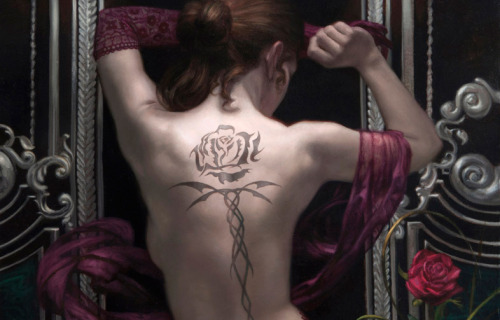
I was talking a lot the other day about the Kushiel books by Jacqueline Carey, and how much I still love them. The alternate history where Jesus had a son who preached “Love as thou wilt” is super compelling, and Phaedre is one of my favorite fantasy heroines – she has a really neat “hook” in that she’s an anguissette, who turns pain into pleasure, but she turns out to be much more than that. She’s incredibly resilient and compassionate, and able to handle it when her devoted soldiers, “Phaedre’s Boys,” make up silly rhymes about her. And she goes through hell, several times over, without losing her humanity.
Image by Donato Giancola
February 13, 2016
"What is the difference between a group of words and a group of words considered poetic? The poem..."
- More from Tongo Eisen-Martin, interviewed in the Poetry Question. Come see him read tonight!
Tongo Eisen-Martin is reading tonight at Writers With Drinks,...
Tongo Eisen-Martin is reading tonight at Writers With Drinks, the literary series that I organize and host in the Mission in San Francisco! Plus Judith Budnitz, Meredith Maran, Pagan Kennedy, Diane Cook, and me! Seriously watch that video and tell me you don’t want to see this amazing poet reading in person.
February 12, 2016
nprbooks:
“As a genre, science-fantasy is often as basic as it...
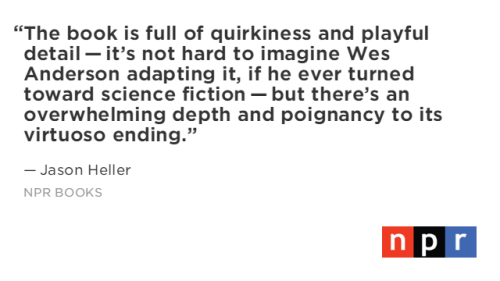
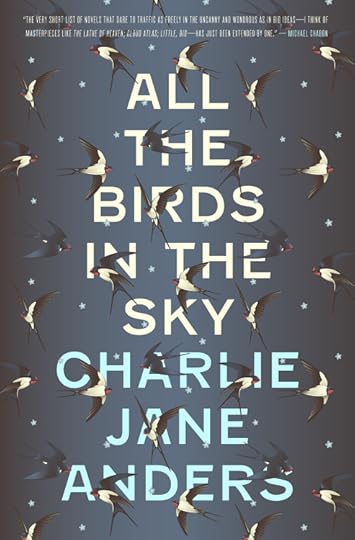
“As a genre, science-fantasy is often as basic as it sounds: People with swords meet people with lasers,” says reviewer Jason Heller. “(In some cases, like Star Wars, the swords and lasers are even the same thing.) But there’s so much more potential in the overlap between science fiction and fantasy, a fact that’s not lost on Charlie Jane Anders.
The editor-in-chief of Gawker’s popular geek-culture website io9, Anders has been writing with passion and insight about science fiction and fantasy for years — so it only makes sense that in her debut novel for adults, All the Birds in the Sky, she’s melded the two genres in a way that opens a profound, poetic new perspective on each.”Having ripped through All the Birds while snowbound this weekend, I can say you should definitely check it out – and see the rest of Jason’s review here.
– Petra
Still completely gobsmacked about this.
Here’s the final one of the GIFs featuring quotes from...

Here’s the final one of the GIFs featuring quotes from #AlltheBirdsintheSky that the lovely folks at Tor helped make for me. You can see the other ones here.
February 10, 2016
Here I am reading from #AlltheBirdsintheSky at Borderland’s...
Here I am reading from #AlltheBirdsintheSky at Borderland’s Books in San Francisco. Science fiction bookstores ROCK!
February 9, 2016
Meet Roberta

I already wrote pieces before introducing the two main
characters of the book, Patricia (the witch) and Laurence (the mad scientist). But here’s a piece about one of
the supporting characters, Patricia’s older sister Roberta. When we first meet
Roberta, she’s kind of a dreadful little girl, but there’s more to her than you
realize at first, and she changes a lot over the course of the book.
As a kid, Roberta appears to be perfect. She gets straight
As, she lives up to her parents’ incredibly stringent expectations, and she
always looks immaculately put together. She even manages to star in a high
school musical while getting perfect grades. But maybe because of the strain of
being so good at pleasing her parents, Roberta has a horribly sadistic streak,
and she tends to torment Patricia.
(Patricia, meanwhile, can never do anything right, either at
school or in the eyes of her parents.)
In one part of the book that I had to trim for length
reasons, there’s a moment where Patricia is planning a fancy dinner party, and
she thinks back to the dinner parties her parents used to throw when she was
little. Patricia would wear an incredibly uncomfortable dress and serve all the
guests (without talking or otherwise attracting any notice.) And Roberta would sit
in the corner and play the viola or the cello, for an hour or two, while the
adults ate – also wearing a starchy horrible dress.
There’s just something about being able to please authority
figures, and always appear perfect, that poisons Roberta’s soul. But without
giving too much away, we get to see some other sides of Roberta later in the
book, and she does some growing up.
Top image: Ccho/Flickr
February 8, 2016
3 thoughts about my book’s weird kids-to-adults structure
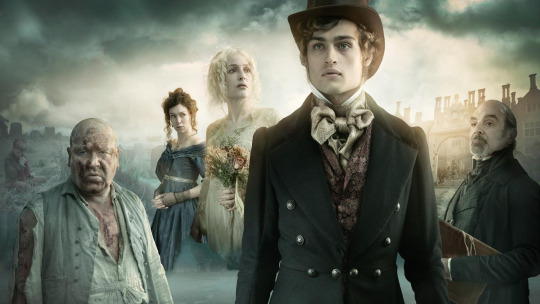
Doing readings in various cities, I’ve gotten asked some
pretty interesting questions about All
the Birds in the Sky. And in particular, it’s been fun to geek out about why exactly I wrote
the book with this weird structure—Patricia the witch and Laurence the mad
scientist are 13 or 14 for a long stretch, and then the book jumps ahead 10
years and they’re in their early 20s.
I already talked here about how I don’t see “coming of
age” as a process that suddenly ends when you turn 18. But here are a few
other thoughts about this odd structure.
1) I read a lot of Dickens and other 19th century novelists
when I was younger, and somehow I ended up with the idea that this is what
novels do. Of course novels start out in childhood and then follow the
protagonists into adulthood. That’s just normal, right? I kind of forgot that
hardly anybody does this any more, because somewhere in my mind Great
Expectations is still a totally normal novel.
2) I’ve heard people describe the book as feeling like a
young-adult novel until it suddenly turns into an adult novel—but I don’t
really think that’s true. Correct me if I’m wrong, but I thought the typical YA
protagonist is a few years older, like maybe 17 years old. You can be younger than that and read a YA book, but I can’t remember reading a YA book whose characters were younger than like 16. Definitely,
Katniss and Tris and their ilk start out around 16. Of course, Harry Potter starts out as an 11-year-old and then ages up over the course of seven books, but I get the impression that’s sort of unusual for a YA protagonist, and some people feel the first few Potter books are actually Middle Grade. So I don’t think the first 1/3 of All the Birds in the Sky is really like
a YA. I think of it much more as being a dark coming-of-age story (Lord of the Flies, Catcher in
the Rye) for adults, which some teens will probably get into as well. (See Friday’s thing about whether All the Birds is appropriate for kids.)
3) I’m just going to quote from what I told Locus Magazine
in an interview a while back. (The whole thing is in their January issue.)
What I was consciously thinking about as I was writing and revising All The Birds in the Sky was
this narrative about finding where you belong in the world, and coming
of age – the notion that we define ourselves through others, and we try
to find people we belong with and can communicate with. When they’re
in junior high school, Laurence doesn’t know any other mad scientists,
and Patricia has never met any other witches. She’s completely isolated.
They’re like, ‘If I can only find people like myself, I’ll be
understood, and things will be perfect.’ Then we skip ahead to a time
when they’ve found people like themselves, but it’s not great, and not
perfect. There’s a whole other set of problems that comes with that. The
people who are allegedly like you have a whole set of expectations they
put on you, and they’re not necessarily connected to the person you
want to be.
Top image: Great Expectations/PBS



